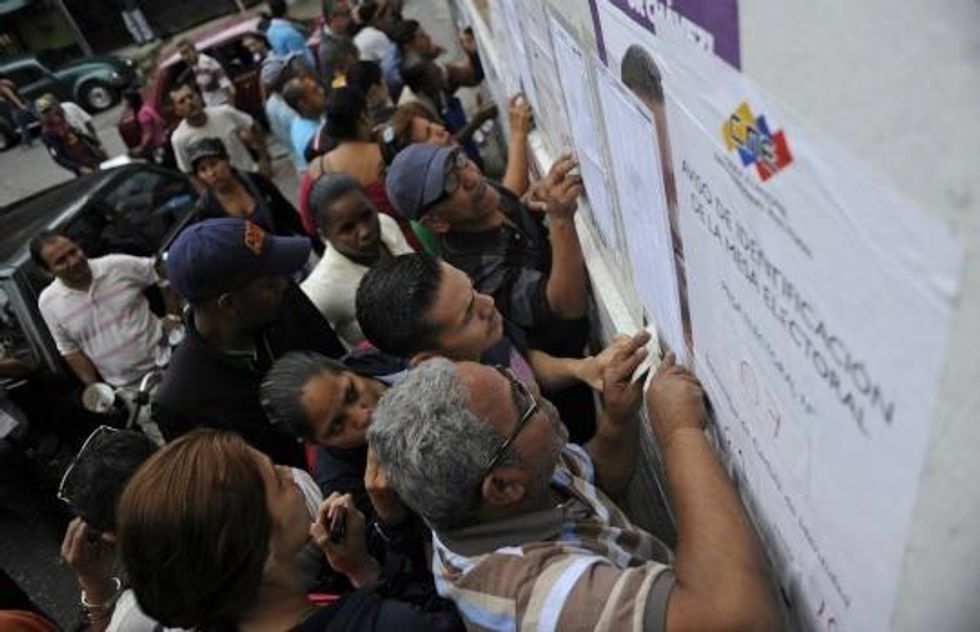

SUBSCRIBE TO OUR FREE NEWSLETTER
Daily news & progressive opinion—funded by the people, not the corporations—delivered straight to your inbox.
5
#000000
#FFFFFF
To donate by check, phone, or other method, see our More Ways to Give page.


Daily news & progressive opinion—funded by the people, not the corporations—delivered straight to your inbox.

Venezuelans went to the polls on Sunday bringing an end to a vibrant presidential race between the 16 year presidency of Hugo Chavez and his challenger Henrique Capriles, a lawyer and state governor proposing vast deregulation and privatization of the country's economy.
Chavez has maintained, at times, a substantial lead in polls, but Capriles allegedly narrowed the margin towards the end of the race. Polls have varied greatly throughout the race.
Supporters swarmed to each respective candidates rallies last week, showing both sides with a mobilized voter base. In a Capriles rally in Caracas last night, supporters banged pots and pans and chanted slogans. During Chavez's final rally Thursday in Caracas, he shouted to the crowd of 3 million supporters: "We're going to give the bourgeoisie a beating!"
Miguel Tinker Salas, professor of history and Latin American studies at Pomona College, told the Institute for Public Accuracy: "The outcome of Venezuela's election on Sunday, October 7 will not only determine who governs Venezuela for the next six years but also who controls the most important proven oil deposits in the world. Regionally, the Chavez election in 1998 became the first of many left electoral gains in Latin America including Brazil, Uruguay, Argentina, Bolivia and Ecuador. Therefore, the outcome of these elections will reverberate throughout Latin America, Washington, Beijing and other world capitals."
The Center for Economic and Policy Research is providing a live blog of the elections here.
* * *
Political revenge. Mass deportations. Project 2025. Unfathomable corruption. Attacks on Social Security, Medicare, and Medicaid. Pardons for insurrectionists. An all-out assault on democracy. Republicans in Congress are scrambling to give Trump broad new powers to strip the tax-exempt status of any nonprofit he doesn’t like by declaring it a “terrorist-supporting organization.” Trump has already begun filing lawsuits against news outlets that criticize him. At Common Dreams, we won’t back down, but we must get ready for whatever Trump and his thugs throw at us. Our Year-End campaign is our most important fundraiser of the year. As a people-powered nonprofit news outlet, we cover issues the corporate media never will, but we can only continue with our readers’ support. By donating today, please help us fight the dangers of a second Trump presidency. |

Venezuelans went to the polls on Sunday bringing an end to a vibrant presidential race between the 16 year presidency of Hugo Chavez and his challenger Henrique Capriles, a lawyer and state governor proposing vast deregulation and privatization of the country's economy.
Chavez has maintained, at times, a substantial lead in polls, but Capriles allegedly narrowed the margin towards the end of the race. Polls have varied greatly throughout the race.
Supporters swarmed to each respective candidates rallies last week, showing both sides with a mobilized voter base. In a Capriles rally in Caracas last night, supporters banged pots and pans and chanted slogans. During Chavez's final rally Thursday in Caracas, he shouted to the crowd of 3 million supporters: "We're going to give the bourgeoisie a beating!"
Miguel Tinker Salas, professor of history and Latin American studies at Pomona College, told the Institute for Public Accuracy: "The outcome of Venezuela's election on Sunday, October 7 will not only determine who governs Venezuela for the next six years but also who controls the most important proven oil deposits in the world. Regionally, the Chavez election in 1998 became the first of many left electoral gains in Latin America including Brazil, Uruguay, Argentina, Bolivia and Ecuador. Therefore, the outcome of these elections will reverberate throughout Latin America, Washington, Beijing and other world capitals."
The Center for Economic and Policy Research is providing a live blog of the elections here.
* * *

Venezuelans went to the polls on Sunday bringing an end to a vibrant presidential race between the 16 year presidency of Hugo Chavez and his challenger Henrique Capriles, a lawyer and state governor proposing vast deregulation and privatization of the country's economy.
Chavez has maintained, at times, a substantial lead in polls, but Capriles allegedly narrowed the margin towards the end of the race. Polls have varied greatly throughout the race.
Supporters swarmed to each respective candidates rallies last week, showing both sides with a mobilized voter base. In a Capriles rally in Caracas last night, supporters banged pots and pans and chanted slogans. During Chavez's final rally Thursday in Caracas, he shouted to the crowd of 3 million supporters: "We're going to give the bourgeoisie a beating!"
Miguel Tinker Salas, professor of history and Latin American studies at Pomona College, told the Institute for Public Accuracy: "The outcome of Venezuela's election on Sunday, October 7 will not only determine who governs Venezuela for the next six years but also who controls the most important proven oil deposits in the world. Regionally, the Chavez election in 1998 became the first of many left electoral gains in Latin America including Brazil, Uruguay, Argentina, Bolivia and Ecuador. Therefore, the outcome of these elections will reverberate throughout Latin America, Washington, Beijing and other world capitals."
The Center for Economic and Policy Research is providing a live blog of the elections here.
* * *